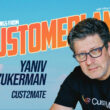In 2011, when Airbnb expanded out of SFO to 22 other locations internationally, they faced challenges with the team’s mix, collaboration, and business transformation. Airbnb survived the challenge by building data-driven culture and empowering its employees to work with data. Instead of the building spoke teams, democratizing data practices helped them go faster in the decision-making process.
Chip Conley, head of global hospitality and strategy at Airbnb, believed that experience of staying in Airbnb is the soul of customer strategy. He accepted that data analytics is the key to understand and connect customer’s voice to Airbnb product line so envisage the experience customers are seeking when select Airbnb.
Today, no industry is untouched from digital disruption and the global economy is perceiving the business of data as one of the emerging sectors. What empowers Amazon to venture into healthcare? It’s the data that enable Netflix and Uber to transform business and build new markets. Per Forbes, the data economy is expected to grow to 35 zettabytes and to analyze this huge heap, organizations need analysts, if not scientists. The skills to analyze data and extract meaningful insights are still a niche in the industry. Most of the organizations relegate data and analytics responsibilities to a central team. No issues with this equation, but the challenge is how to scale and stay sustainable in the long run.
“Data democratization means liberating data and getting data into the hands of decision-makers” – Chris McGrath, SVP, Data Strategy and Consumer Intelligence, Viacom
The other major challenge is teaming and communication. Data scientists and business teams spend days in pointless discussions trying to dig through a problem. The lack of data literacy and ability to paint the business context causes brings friction between teams. This impacts business’s decision velocity and the ability to react on the fly, to internal or external factors.
What should organizations do?
The best way to bridge this gap is to establish data driven culture where everyone (required ones) understands data and possesses elementary knowledge on data driven outcomes. Democratization enables the sharing of tools, knowledge, and skills to consume data and back your decisions with data insights. In the current scenario, almost every industry hold large volumes of data and those who make sense of data succeed. While small central team of data and AI specialists bring standardization, democratizing tools and skills to generalists across the organization may bring empowerment and the ability to exploit data rapidly at scale.
Five-point strategy to democratize data science
Without data, there can’t be AI. To democratize data science, first step is to democratize data. If employees have access to data and the ability to explain it, all they need is a tool to build data models and judiciously apply data science techniques.
- Evangelize DATA – For business users to work with data, it is crucial for them to realize power of data. Business users must be educated on problem solving with data, intermediate level of SQL skills, and exploratory data analysis. Data training programs help in upskilling users at a much lower cost, but with a bigger impact. A collaboration workspace suite may act as a repository of FAQs, tutorials, and peer-to-peer discussions.
- Define PERSONAS – A persona is an employee’s context mapped to his access rights. Organizations usually start with an assessment to survey different roles and capture approaches to consume data. The objective is to define personas, understand what they look in data and build data access framework. For instance, CXO layer needs a dashboard for storytelling with data and visual insights. Likewise, business analysts might need data models for ad-hoc analysis to advise based on factual insights.
- Share TOOLKIT – Leave aside specialized AI tools, centralized data science teams can share tools that can connect to data systems, query data, run basic analytics, and generate insights. Data science specialists will no longer be burdened by ad-hoc data requests from the business. For standardization viewpoint though, organizations also position a self-service data platform – a low-code platform with drag and drop features, auto ML functions, and data viz capabilities.
- Build AI components – Democratization of data science starts with self-service data and matures with pertinent use of AI. Data scientists can publish generic pre-trained ML models that can integrate with other products. These packaged solutions enable rapid innovation, avoid rework by saving time and bring standardization.
- Transform CULTURE – Disruption tends to transform culture by challenging established processes. Democratization is one such disruption that is often perceived with reluctance and hesitation. Organizations must relay the larger vision with the employees for a better tomorrow.
Impact and challenges
Democratization of data helps in breaking silos and empowering business users when and where required. They need not engage with product or data science teams to explain and justify their case to bring up on priority. Data and the essence of AI enriches with questions. More eyes on the data, more questions and this could result in some unexplored opportunities.
Business users, who might love to dig deeper into data, will emerge as citizen data scientists. Citizen roles in data analytics space have ability to think critically and interpret data science outcomes. Business teams with non-technical past must look forward to building this role internally for rapid inquires on data and analytics.
With all rewards being detailed, there are risks too with democratization. More users accessing data might put a question on data integrity and privacy. Data access framework should align with organization’s security and privacy norms. Confidential data can still exist in silos and doubly validated when requested.
The other challenge is how precisely one interprets the results of a data science exercise. AI results could appear inutile, if misinterpreted. Teams or individuals accessing data must understand the application of data science techniques and must know how to explicate the results. Focused training on data and data tools enables effective onboarding of employees.
Data for everyone
For data democratization to be effective in VUCA world, organizations find that a centralized data strategy is imperative in breaking data silos into a unified data platform like data lake. Strong data governance in an ever-evolving data lake ecosystem guarantees data availability, keeps check on data quality, and brings consistency in architecture. Companies starting their democratization journey need to reflect into their digital strategy and evaluate data readiness. They can start small with few business teams, target quick wins, share tools and practices, and then go big with evangelization.
This article originally appeared in AnalyticsIndia. Photo by Daniela Bi on Unsplash.













Informative blog. Thank you for sharing with us..
Data Science Online Training